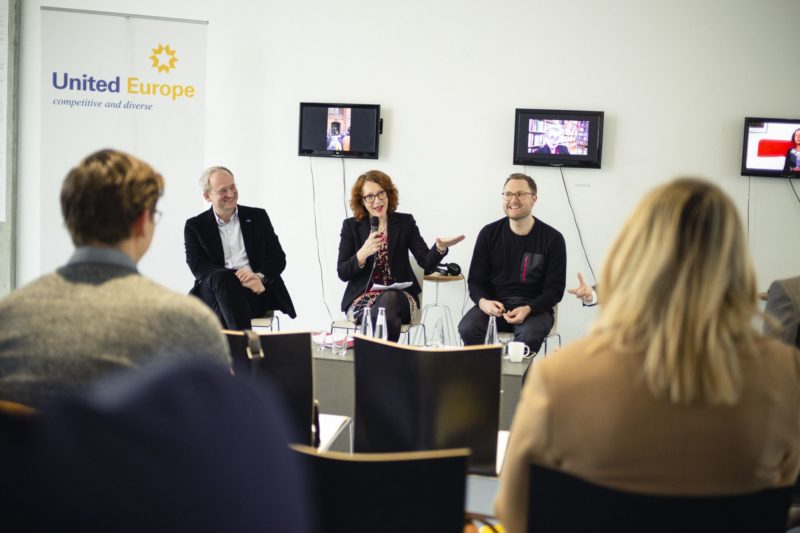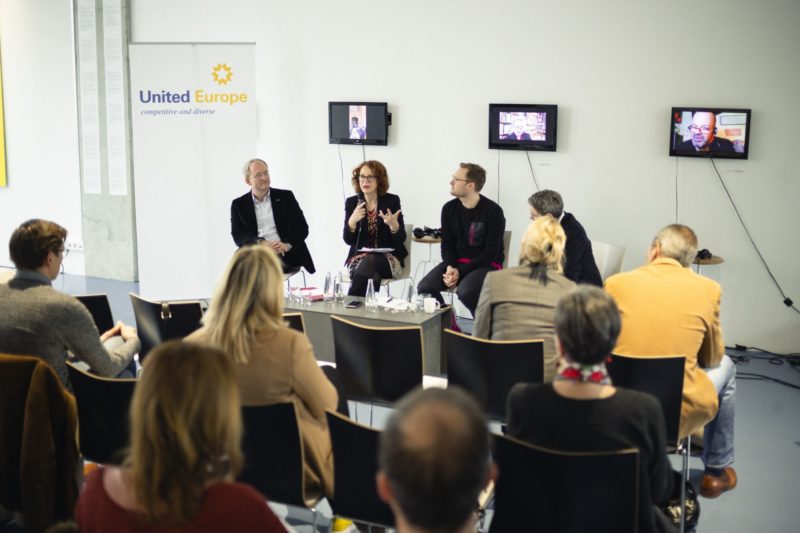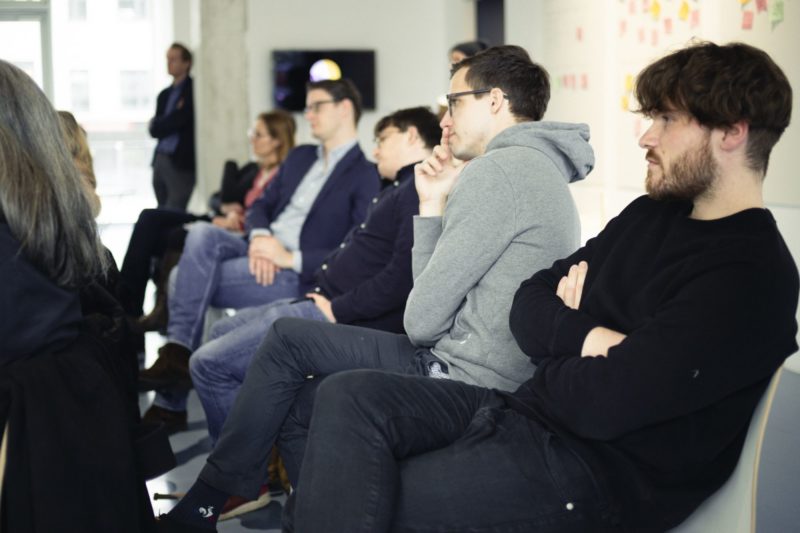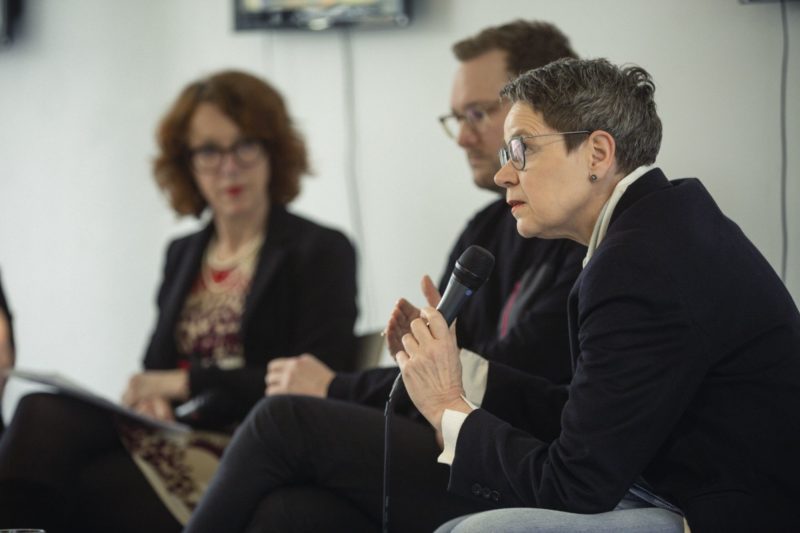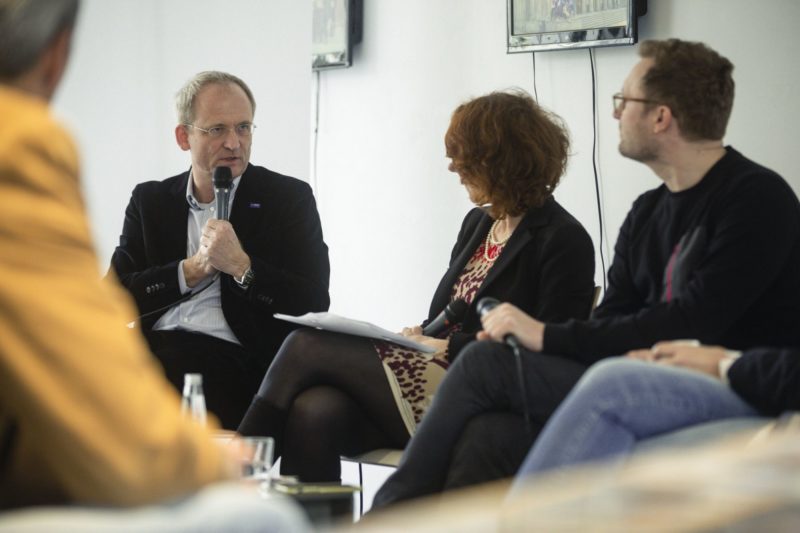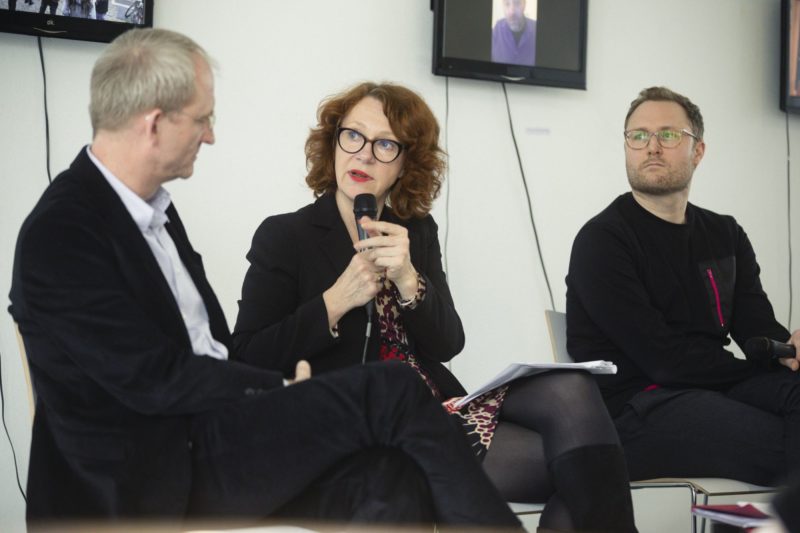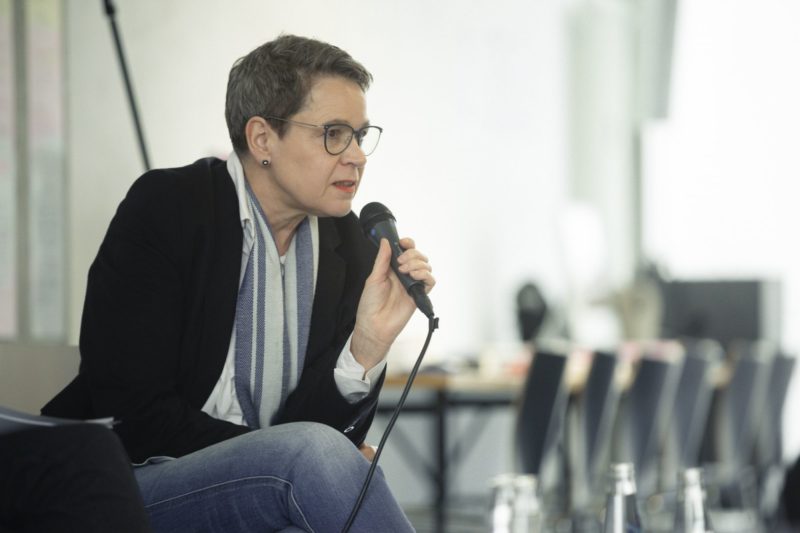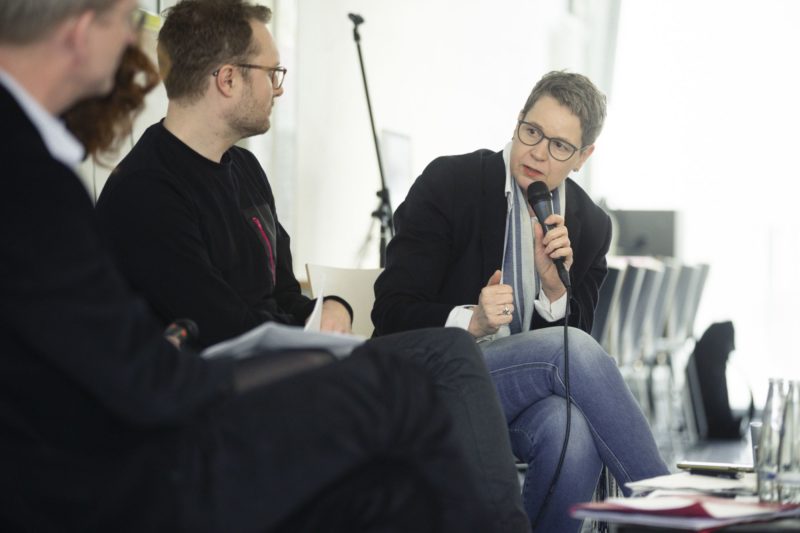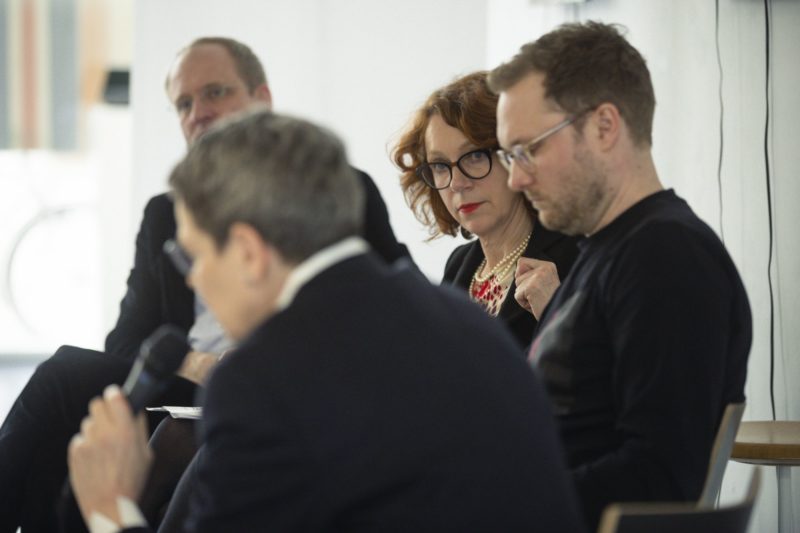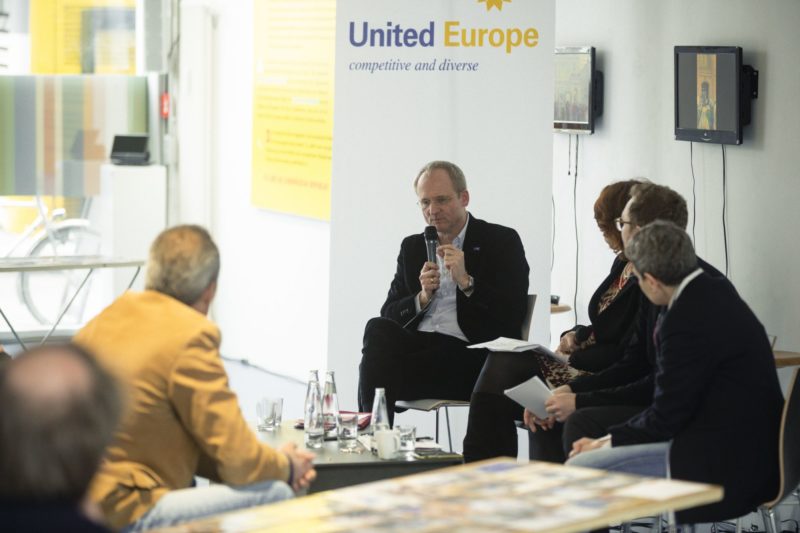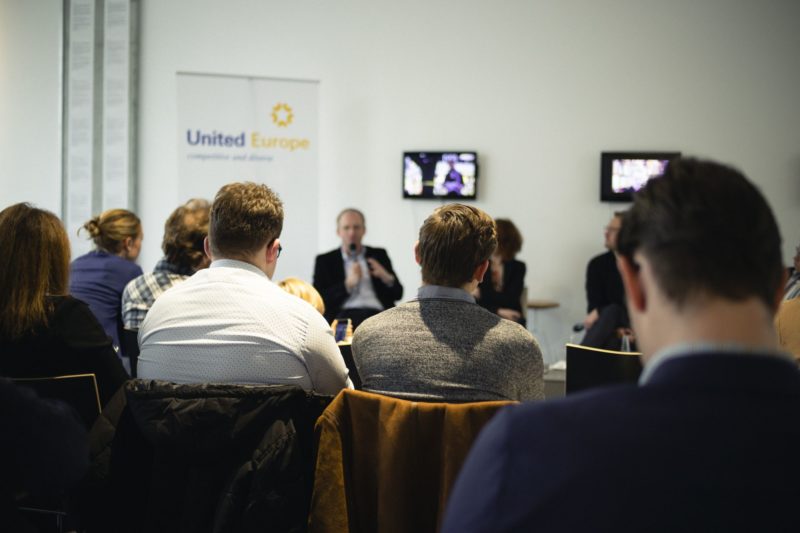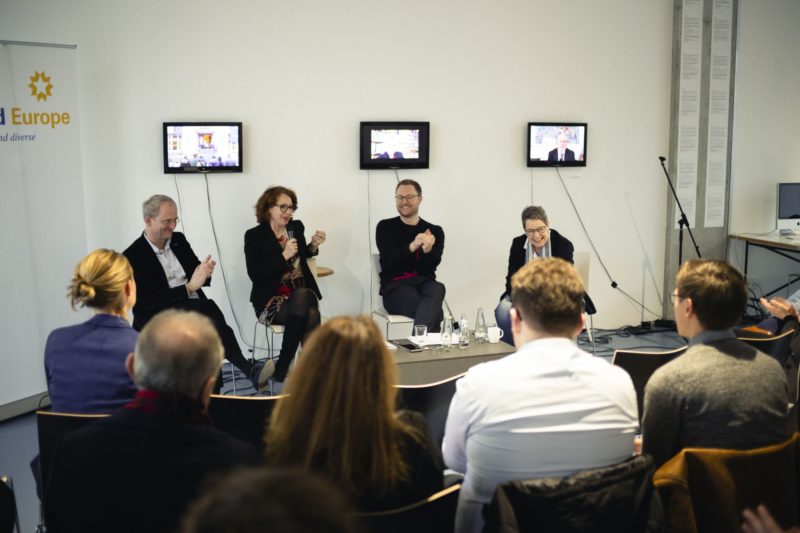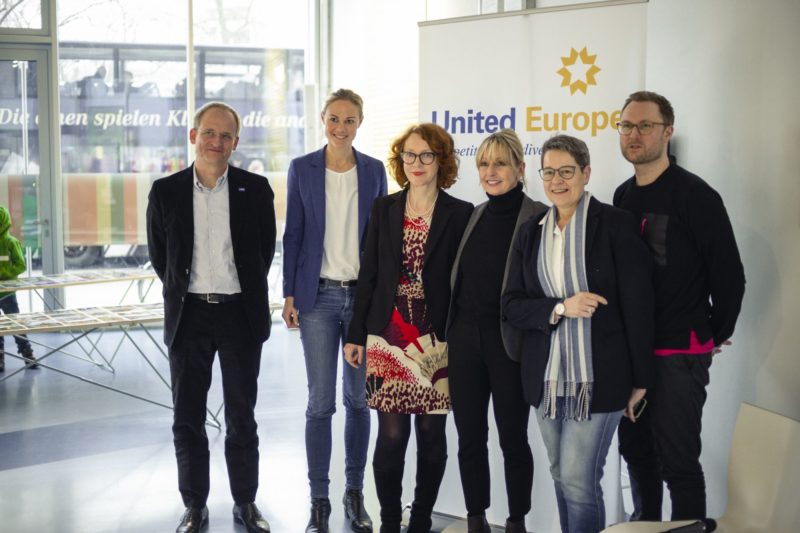“Power and Responsibility: What role do leaders play in European political debates” was the title of a discussion United Europe hosted on 2 March as part of the F(EU)TURE Festival at CLB Berlin (Aufbauhaus).
Panelists included Simone Menne, a manager and multi-supervisory board member who became the first female CFO of a DAX-listed corporation (Lufthansa) in 2012; Henrik Schmitz, Vice President Communication Strategy at Deutsche Telekom; and Christian Schubert, Head of BASF’s Berlin Office. The talk was moderated by well-known political scientist and author Prof. Dr. Ulrike Guérot, founder and director of the European Democracy Lab, an intergenerational think tank that celebrated its fifth year of existence with F(EU)Ture Festival.
The lively debate focused on the question as to whether European board members, entrepreneurs and business executives should take a political stand and publicly express their views on European issues, have a greater hand in politics and assertively fight for Europe, as René Obermann, United Europe founder Jürgen Großmann and others have called for, or whether they should stay out of politics, as they mostly have the best interests of their own companies in mind and cannot objectively intervene in inter-European affairs.
The question drew an engaging dialogue about expectations and the distrust of business leaders, possible political and social responsibilities as well as the obstacles that European politics poses to both businesses and citizens on its path to a truly united Europe.
Ulrike Guérot opened the discussion with the remark that, in her opinion, executives and supervisory boards are also always citizens and therefore should and even must interfere in political debates as a matter of course. She believes that it would be “intuitively wrong” for a company to extricate itself from a process “that necessarily affects society as a whole”.
Telekom spokesman Henrik Schmitz stressed the role of companies as corporate citizens that also always reflect society at large. Telekom views itself as a “socially committed citizen” that takes action by sponsoring sports and cultural events, for example, creating jobs and crating daycare centres that make it possible to combine family and career. It also strongly identifies as a citizen of Europe, of course, “because we operate in European markets and represent European values”. Yet companies also find themselves in a dilemma in this area, he says: Doing something good also means doing something to enhance the product’s image, Schmitz explained, which is why social commitment always has to be justified to shareholders, for example.
Simone Menne believes companies have an obligation to make connections, but noted that it happens far too rarely. Businesses have a keen interest in globalisation and in Europe because that is their market. Still, many find it tricky to comment on a European financial or tax policy because it would automatically be interpreted as siding with a party and/or a politician, the first of which could both lead to generalisations in the sense of agreeing to the entire party platform, and it be interpreted as opposing other parties.
Christian Schubert also believes that companies and business leaders must get involved in the public debate. Every manager is also a citizen, he says, but as with politicians, no CEO speaks purely as a citizen, but always as a company representative as well. This is why managers and CEOs always have to be particularly cautious with their statements and weigh them carefully, because the public does not distinguish between the company manager’s personal views and that of his business.
Schubert argues that participation in debates ultimately stems from the company’s purpose and mission. BASF’s corporate purpose is chemistry for a sustainable future, an idea that sits at the heart of its corporate strategy. Europe is deeply relevant to BASF because it accounts for half of its sales and more than half of its employees. Schubert added that it is precisely in these times that every company is realising how important its home market is.
Social commitment today goes far beyond cultural and social donations; instead it centres on the contribution a company makes to society. To this end, BASF has developed the “Value to Society” pilot concept, which examines both the benefits BASF creates for society worldwide and the costs it incurs as a chemical company, a fact that no one in BASF’s Board of Executive Directors could turn a blind eye to. This really goes “to the core of the company’s activities and it is imperative that we take part in this public debate”, Schubert explained. “We can only achieve something by entering into partnerships. We cannot act in a way that is at odds with society. We have to be integrated and have close partnerships with all sorts of social and civic groups if we are to be successful in the long term.”
Schubert believes “we are at a point where it is important to fight for Europe.” BASF also brings these issues to the workforce by organising EU-focused dialogue sessions for its employees at various sites. It also reaches out to the public and speaks about Europe – also as it relates to the company – through topics such as innovation and industrial policy, which have a major influence on many other areas. Moreover, the German chemical industry association Verband der Chemischen Industrie is set to launch a “get out the vote” advertising campaign before the EU elections. This is not a recommendation to vote for any particular party, but a neutral call to boost turnout for the European elections.
Speaking on the subject of competitiveness, he says the EU’s biggest problem is that the internal market has yet to be integrated. Europe struggles to create competitive start-ups because each country has different laws and regulations. This raises the interesting question of the extent to which there should be a Europe-wide tax and financial policy if Europe is to be successful. Companies have so far been reluctant to answer this question because they do not know how it will affect them and what it means for their business.
Schmitz pinpointed the dilemma of companies when he said that although Telekom is committed to connecting people, there are still gaps in the signal network; the company stands firmly for democracy and European values, but is also active in countries where these values may not count for much. But even in those places, people want to make phone calls and surf the web, and this might, Schmitz says, “do more to contribute to a democratisation process than closing the shops there would”. The credibility line is very narrow in these places, he says, which is why the company takes great care to remain reliable and trustworthy.
Simone Menne noted that it is almost impossible to engage in debates these days, to allow different opinions to be aired and to discuss them objectively. Everything ends in a “shitstorm” and indignant debates. Hence, there is a great deal of concern on the part of companies and managers that statements will result in a big firestorm that includes threats against family members, as Joe Kaeser experienced when he expressed opposition to the right-wing Alternative for Germany party (AfD) on Twitter.
Schubert advises CEOs not to interfere in short-lived current affairs, if only to avoid exposing themselves to social media “hysteria”. More important, he says, are longer-term developments and topics, which also includes European issues.
Guérot asked how it might be possible to turn an EU that has hitherto been more of a competition between 28 or soon 27 nation states in which each pursues locational and tax advantages into a joint project capable of realising a political union, democracy and a Europe of citizens, and how the tension between the EU as a business model and a Europe of citizens might be bridged. At the moment, Guérot says, it is European citizens that are emerging as the major breaking point of the European project, and the question is how to connect them to the single market business model for which the EU was once conceived. The European idea appears to have slipped by the wayside, Schubert noted. Brexit is a powerful wake-up call that reminds us of what we stand to lose. Perhaps one should revisit the “bicycle thesis” that Europe “must always move forward like a bicycle, otherwise it will fall over. Perhaps we have just been cycling in circles for years now”. He believes that many people feel disconnected at the moment, not only economically, but also socially and culturally. So it is important to go to the marketplaces and engage in discussion so as to re-establish a sense of community and pro-Europeanism. Until now the discussion about Europe has mainly taken place among elites, where there is a great deal of consensus about the importance of the European project. There is far too little discussion as to how we might shape Europe in such a way that truly everyone benefits.
Schmitz notes that the “kick” that holds Europe together is not only the community of peace and values, Schengen and no borders, but also the prosperity that this society generates and, above all, distributes. Companies have a vital role to play in this regard. And competition between the individual nation states within Europe would be a great loss indeed. Another option would be to divide economic interests not along national lines, but between clusters and regions. While this would shift conflicts of interest to other levels, it would also enable other alliances and strengthen clusters as such, and these in turn could develop individual competencies. See Silicon Valley, which in itself is not America per se, but Silicon Valley.
Menne points out that at first it was perfectly okay for the EU to be made up of different countries with distinct competitive advantages because all of them had benefited from it for a long time. Today it is difficult, if not impossible, for companies to opt out of the Irish tax saver scheme while everyone else is using it. Then Ryanair and EasyJet are super cheap while Lufthansa is not. There is also constant debate as to whether, for example, a plant should be opened in Hungary because of the political situation there. Would opening the plant be a good thing because the jobs and prosperity it brings will help people think more democratically, or will it only serve to promote an undemocratic system? The only way to solve this is to have solidarity among citizens, because the national governments themselves are in a spiral and have no interest in a solution.
More vigorous labour exchanges and open borders could create solidarity among European citizens, he says. This could also be achieved through uniform tax and financial legislation throughout Europe and a European finance minister. At the moment, Europe is only getting in its own way as a result of internal competition. Europe cannot take the next step toward forming a true union until it embraces shared prosperity and a common corporate and industrial policy, and promotes innovation.
Guérot stressed that there are income differences within Germany as well, but that they are all subject to the same tax and social security system. According to Guérot, this balancing system has to be extended to the whole of Europe if we are to approach a true internal market and social justice. It would require a European social security number and European unemployment insurance, as recently proposed by Olaf Scholz. Such a system would prevent debates over whether “the Greeks” should get money from “the Germans” or not, because it would institutionalise solidarity.
Financing this model would require an assertive European industry that sees itself as the driver of a socio-economic process. The panel agreed that this could be a way to make Europe more competitive again. It would have the advantage for companies that they could think of Europe as an integrated system and not as a Europe in which there are 27 different social security accounting systems. That is an immense burden and therefore a disadvantage for global companies operating in different European countries. Such a move would take discussions such as the failed merger between Siemens and Alstrom to a different level as it would be considered under pan-European competition law, which presumably would have allowed it.
One major problem, however, is the public’s distrust of industry, which is perceived as having its own economic interests rather than those of citizens’ well-being and a functioning Europe at heart. Further, there is no “story” about Europe, no common identity and no European public sphere. Achieving this would require greater interaction between the populations of different European countries, between cities, schools, associations and professional groups, so as to get to know the reality of life in other countries. Companies operating in different countries also have a duty and opportunity to work on this issue and to intensify dialogue between their employees.
Consequently, the panelists made an urgent appeal to European policymakers to finally allow Europe to operate as a whole if it is to avoid falling completely behind the United States or China. Part of this would also be the standardisation of educational pathways, so that vocational training for skilled workers is also recognised in other European countries.
The EU also has a major problem when it comes to infrastructure: There is no shared system for train, air or road transport, which to this day renders a true, single European market impossible.
Ulrike Guérot believes that the moment Europe has to agree on a common retirement age, European public interest would pique overnight. She points to the European Union’s most recent successful projects – a common market and a common currency – which came about only because industry and banks were strongly in favour of them. Now, Guérot says, companies and industry should take the lead in a movement to complete the European Union through a shared social security and tax system. Germany’s own nation-building only succeeded when a single health, pension and unemployment insurance system was put in place across all its previously independent regions. Why wouldn’t Europe be able to do the same?
Schubert raised concerns about demographic developments. In the near future, fewer and fewer young people will have to finance the pensions of more and more senior citizens. This could pose an undue burden on Europe’s future. He also questions whether companies are the right ones to put themselves at the forefront of such a demand. The suspicion that companies primarily pursue their own interests runs too deep. Perhaps, Guérot said, we should use newly conceived social models to map out a social transformation process within Europe. Rather than compete against one other at a national level, we should consider the necessary transformation from industrial to digital society and the associated socialisation process in newly conceived European social systems.
After an in-depth question and answer session with the audience, the discussion concluded with the following insights:
– Solidarity and the interests of citizens and businesses are not inherently contradictory.
– We can unite if we continue to work on what brings people in Europe together.
– Internal competition law must not be allowed to interfere with Europe’s outside interests.
– Infrastructure programmes must be Europeanised, whether in terms of frequencies, transport or trade.
– We need to develop new, innovative methods not only in the fields of technology and the economy, but also with regard to new social models. A combination of the two should be used to create a united Europe, supported jointly by citizens and businesses alike.
The discussion is to be continued at a later time.
Photos: ©Frieder Unselt



